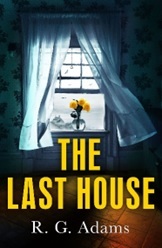Review of The Last House by R G Adams, pub. Quercus Books 2022

“As she pushed through the swing doors, the noise level hit her ears so hard that she flinched. Rows of social workers wearing headsets were taking call after call from anxious, desperate people and attempting to re-route them to overloaded teams. The buzz of it was electric; she’d thought about applying to work in the team herself when she’d finished uni. But the repeated sifting and passing on of referrals would have driven her nuts, not being able to work with families properly, never following anything through. It was a job that clocked up a lot of brownie points if you could hack it, though, not least because one tiny mistake could mean something catastrophic happening to a child.”
Kit Goddard, South Wales social worker specialising in child protection and the protagonist of R G Adams’ novel Allegation, reviewed here, is back on another case. Think police procedural, only for “detective” read “social worker”. As you can see from the above, the author writes with the assurance of one well acquainted with the milieu in question and brings it convincingly alive as she did in the first of these books.
Kit is still terrier-like at her job, harassed by her dysfunctional family and has an entertaining line in observational cattiness: “Sisters, Kit reckoned, and they were clearly unnaturally close, because they’d recently shared a shade of Nice’n Easy that was way too harsh for both of them”. At the start of this novel, she is missing her former boss Vernon, off work with the minor heart attack he suffered near the end of Allegation, and replaced by Georgia, who has neither his dedication to the job nor his disregard for red tape. Georgia and the head of the mental health section, Tim, are both eager to close a case involving a teenage boy and his mother living in isolation; Kit is sure they should not and pursues answers on her own. For obvious reasons, I’ll avoid saying too much more about the plot.
The physical setting, in the valleys and seaside towns of South Wales, is handled with as much assurance as the social work scene. The echoes of the miners’ strike and the Italian influence in the area never sound contrived or dropped in for effect, and the local dialect, (as I can promise you, having lived there many years) rings true: Mal’s ‘You need to think twice by here, Gio’ is dead right. Indeed the dialect throughout is both lively and convincing:
‘You know that thing about you can’t miss what you never had?’
‘Yeah?’
‘That’s bollocks, then.’
‘Seems it must be. You miss the hope of having it one day, I guess.’
‘That’s deep, that is. You could get that put on a tattoo.’
‘Shut up.’
Of course, the main requirement for a novel like this (is there a word for a police-procedural where the protagonists aren’t actually police?) is that it should be a page-turner, giving enough clues to the solution but not too many, and maintaining both the tension and the reader’s anxiety to know what happens next. Since I read it in an afternoon and only a couple of sittings, I should say the answer was a resounding yes. Nor is it essential to have read the earlier book, though I can certainly recommend it; this is a standalone, albeit with several of the same characters. Though for all the satisfaction of solving mysteries and meeting again some engaging and believable characters, I think what I like most about these books is the laconic voice the author shares with her protagonist, as when Kit is mentally translating an address out of Welsh: ‘So, it was Last House, High Rock, Long Valley. And under the Cold Mountain, to boot. Perhaps the council had named the street ‘Sunnyside’ in an attempt to cheer the residents up.’



